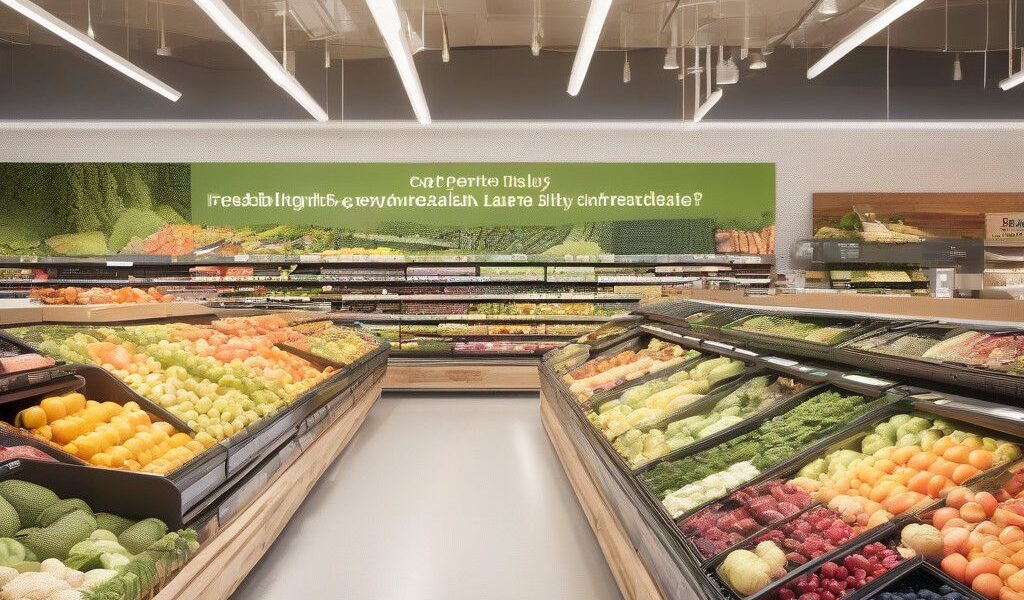As ALDI expands its physical store footprint, the company is committed to minimizing its environmental impact by becoming a leader in sustainability. With plans to open 800 new stores in the next five years, the retailer is also focusing on reducing greenhouse gas emissions and transitioning to natural refrigerants across all locations within a decade. Furthermore, ALDI aims to achieve net-zero greenhouse gas emissions in its value chain by 2050.
ALDI’s 2023 Sustainability Progress Report, released in late October, highlights significant advancements in its environmental, social, and governance (ESG) initiatives. The report outlines ALDI’s achievements, such as earning the most Environmental Protection Agency (EPA) GreenChill store certifications, eliminating plastic shopping bags at checkout, and operating over 700 stores with eco-friendly refrigerants.
In an interview with Josiah McClellan, the Director of Sustainability at ALDI USA, the retailer’s commitment to reducing environmental impacts across various dimensions becomes clear. McClellan emphasized the importance of focusing on five key areas: reducing emissions, enhancing packaging, minimizing waste, responsibly sourcing products, and supporting communities.
He stated, “Equally focusing on all of these areas is essential to fueling our ambition to become the most sustainable grocer in the country and to make sustainability affordable and accessible for all.” This comprehensive approach not only targets the environmental aspects but also addresses societal needs by linking sustainability with affordability.
Concrete examples from ALDI’s sustainability efforts include initiatives aimed at eliminating deforestation in high-priority supply chains, powering all operations with renewable energy, and reducing packaging waste. ALDI is proud to partner with organizations that combat food insecurity while effectively reducing food waste.
When consumers visit an ALDI store, they can experience the retailer’s commitment to sustainability firsthand. McClellan points out that ALDI stores are designed with efficiency in mind, being about half the size of typical supermarkets. This size allows ALDI to stock primarily the most sought-after products in popular sizes, which results in less waste. By not offering plastic bags at checkout, ALDI also reduces the circulation of plastic products.
The retailer’s infrastructure is being transformed to enhance its sustainability performance. As one of the fastest-growing grocers in America, ALDI is focused on implementing sustainable practices during its expansion. For instance, it has started purchasing environmentally friendly refrigeration systems for all new and remodeled stores to support its goal of transitioning to natural refrigerants by the end of 2035. In addition, trial efforts with heating systems that do not rely on fossil fuels and installations of solar panels on store rooftops are underway whenever financially feasible.
McClellan reiterates that ALDI leadership is deeply committed to this sustainability journey, making it an integral part of the business strategy. The collective effort from employees across the organization is crucial in carrying out these sustainability practices. Whether it’s engaging customers about reusable bags, finding ways to reduce operational waste in warehouses, or ensuring shelves are stocked with responsibly sourced products, every team member plays a role in this mission.
One of ALDI’s prominent waste reduction goals is to achieve zero waste in operations by the end of 2025. This target includes diverting 90% of waste from landfills through recycling, donations, and organic recycling programs. McClellan explained, “To make progress on these goals, we’ve optimized our ordering protocols and technology to minimize over-ordering from the start.”
ALDI is also focused on reducing food waste significantly, aspiring to cut it by 50% by 2030. Collaborations with organizations like Feeding America help to ensure that unutilized food finds new homes instead of heading to landfills. Moreover, the company diligently seeks to reuse and recycle materials such as wood pallets, cardboard, and plastic whenever possible.
The sustainability milestones that ALDI is working towards by 2025 include reducing Scope 1 and 2 emissions by 4% compared to a 2021 baseline, installing only natural refrigeration systems in new and remodeled stores, and reducing ALDI-exclusive primary packaging materials by 15%. Furthermore, by the end of 2025, ALDI plans to certify all private-label coffee as responsibly sourced.
Partnerships with suppliers play an essential role in ALDI’s sustainability strategy, especially since 90% of products in its stores are ALDI exclusive. McClellan mentions that collaboration with suppliers enables ALDI to maintain high standards for environmental and societal care. Recently, ALDI joined the Supplier Leadership on Climate Transition (Supplier LOCT), which aims to support suppliers in achieving science-based greenhouse gas emissions reduction targets.
In conclusion, ALDI’s commitment to sustainability is not just a corporate responsibility but a core part of its business operations. By focusing on innovative practices and strategic partnerships, ALDI is setting a precedent for sustainable grocery retailing. The positive impacts of these efforts resonate through the communities it serves and bolster the brand’s reputation as a responsible retailer.











